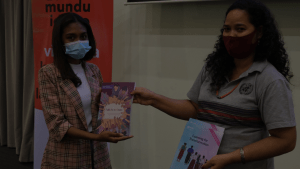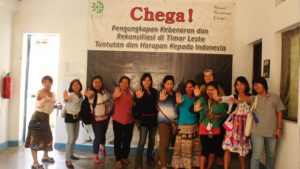Timor-Leste
Timor-Leste is a leading country in Asia with regards to advocating for greater accountability. While many conflict and atrocity prevention initiatives have been marred by setbacks, notably serious communal violence and population displacement in 2006, important lessons have been learned on grassroots, locally-led reconciliation processes. These conflict and atrocity prevention lessons provide a valuable body of knowledge that can be shared across the region.
After twenty-four years of systematic violations under a veil of impunity, Reformasi in Indonesia provided an opportunity to determine East Timor’s status through a referendum held by the United Nations in 1999. The referendum resulted in the majority of Timorese people choosing independence in October 1999 with the United Nations taking over as interim administrator of the territory.
UN and Timorese investigators and prosecutors conducted investigations to the 1999 crimes, resulting in more than 300 persons indicted under the Serious Crimes regime, including senior Indonesian military commanders and Timorese militia leaders. In 2002, working in parallel with the serious crimes process, a truth and reconciliation commission (CAVR) was established to investigate human rights violations that took place between 1975-1999, producing a final report entitled “Chega!” (Enough, Never Again) that documented a pattern of systematic abuse and made comprehensive recommendations. Immediately following the CAVR, the Governments of Timor-Leste and Indonesia established the bi-lateral Commission of Truth and Friendship (CTF, 2005-2008). In 2008, the CTF handed over its findings and recommendations reaffirming CAVR’s findings that crimes against humanity took place in 1999. More than a decade after the publication of these reports, a civil society working group including AJAR found that only 5% of the recommendations has been or is being implemented. In 2015, a prime ministerial decree established Centro Nacional Chega! (CNC) tasked with bridging the victims with the administration and pushing for the inclusion of the recommendations in government policies.
In Timor-Leste, AJAR works to empower local partner organisations, most notably our sister organisation Asosiasaun Chega! ba ita (ACbit) to support victims’ groups, women in particular, to raise public awareness about the importance of learning from the past and to advocate for the protection of human rights. In addition, AJAR provides technical assistance to the National Victims’ Association as well as government institution such as Ombudsman for Human Rights (PDHJ) and Centro Nacional Chega! (CNC). AJAR works closely with universities to ensure that human rights education becomes a part of their curricula while seeking alternative ways promote these principles for the younger generation such as the edutainment drama series “Waves of Justice.” AJAR Timor-Leste is also a member of various working groups such as Security Sector Reform Network and the Network for Land to ensure that rights of the victims are considered in the drafting of new laws and policies. In 2017, AJAR was leading the NGO coalition that produced a shadow report on the government’s implementation of the Convention Against Torture principles.
What are we doing in Timor-Leste?
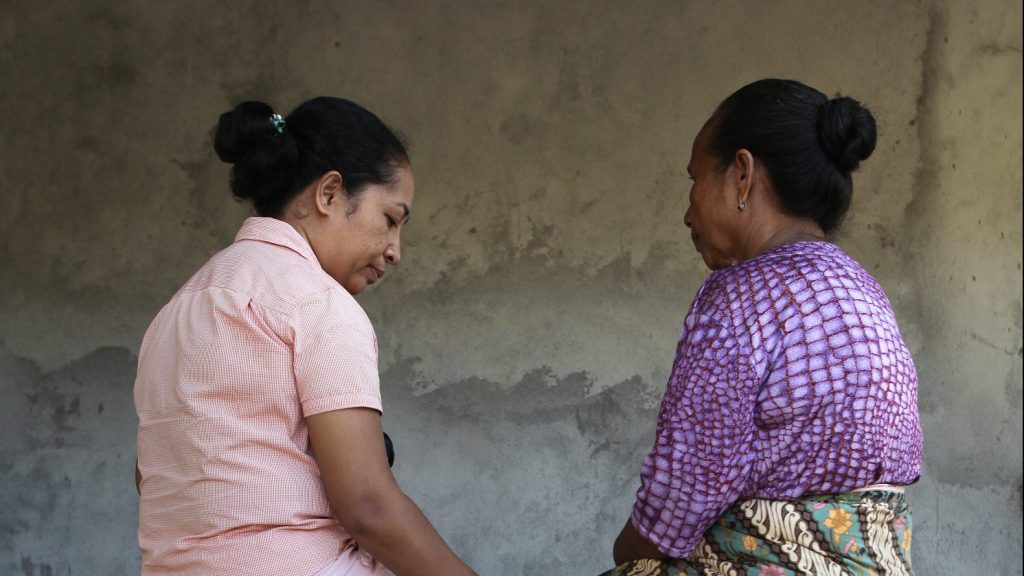
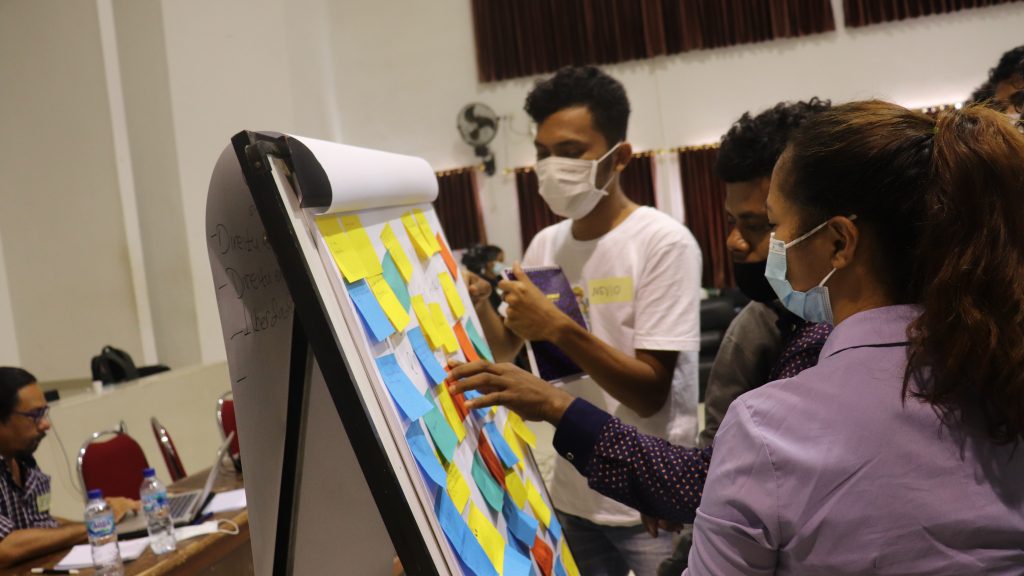

Our Program
Highlights of Programmes in the Past Year
Promoting awareness and understanding
Research, including interviews with hundreds of victims of serious human rights violations, examined the challenges faced by the pandemic in Indonesia and Timor-Leste. The research, combined with practical assistance, helped victims develop coping mechanisms to survive.
The ‘school of human rights and social justice’ for young students in Timor-Leste continued. This year more than 100 university students attended activities, building their commitment to fight against the recurrence of past violations.
Strengthening linkages and increasing social capital of human rights defenders
By linking the Aceh Truth and Reconciliation Commission with Timor-Leste’s Centro Nacional Chega! or CNC, AJAR facilitated exchanges of knowledge and strategies on truth-seeking, reconciliation, and designing urgent reparations programs. Young people from Papua, and other parts of Indonesia and Timor-Leste, visited the Aceh TRC to deepen their understanding of the work of truth commissions.
As a member of the Global Initiative for Truth, Justice, and Reconciliation, AJAR and partners worked to identify best practices for supporting women survivors of sexual violence, and children born of rape, in Timor-Leste, Nepal, Bosnia Herzegovina, and South Africa. Comparative studies on searching mechanisms in Latin America and Timor-Leste, and peace processes in Aceh and El Salvador were developed.
Contributing technical assistance, along with policy and legal inputs
AJAR contributed to regional and national links to UN bodies. Inputs, along with victims’ testimonies, were provided to UN events on reparations, focusing on empowering Timor-Leste’s stolen children.
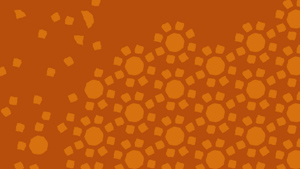
AJAR and Civil Society Gather in Timor Leste for ASEAN Civil Society Conference 2024: “Toward A People-Led Democracy and Sovereignty in Southeast Asia”
Asia Justice and Rights (AJAR) and civil society organisations from South-East Asia gathered at Escola Secundaria Técnica Vocacional-Grupo de Tecnologia...

Regional: Asia-Pacific Communities Showing the Way in Peacebuilding – Building Bridges, Not Just Treaties
Reconciliation agreements and grand ceremonies between warlords have not sealed the peace, as too many have found in post-conflict societies. ...

Timor-Leste: History Teachers in Trained on Human Rights, Reconciliation, and Peacebuilding
Dili, Timor-Leste, 27 March 2024 — At the end of March, Asia Justice and Rights assisted the Centro Nacional Chega!...

Timor-Leste: National Seminar Youth Examine Root Causes of Conflict, Raise Recommendations and Manifesto for Peace
Timor-Leste has a long history of group conflict. In the Portuguese colonial period, gangs named Moradores were used to repress...
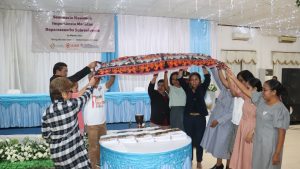
Timor-Leste: Bukae ba Sobrevivente, New Study on Reparations to Survivors of Sexual Violence during the 1975-1999 Conflict
“During the period of conflict in Timor-Leste, sexual violence had a profound impact on its victims and on the general...
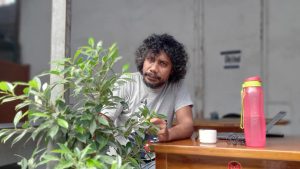
Timor-Leste: AJAR Mourns Sisto dos Santos
Sisto dos Santos, or Maun Sisto as we dearly called him, was a brave activist who dedicated his life to...
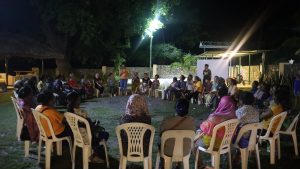
Timor-Leste: Taking the Next Step — Right to Reparations for Survivors of Sexual Violence
Women and other survivors of the widespread sexual violence during Timor-Leste’s 24-year conflict are ageing and continue facing new struggles...
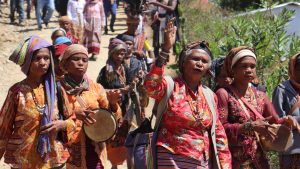
Indonesia-Timor-Leste relations: Good neighbors and unfinished business
This article was published in the paper edition of The Jakarta Post with the title " Indonesia-Timor-Leste relations: Good neighbors and...
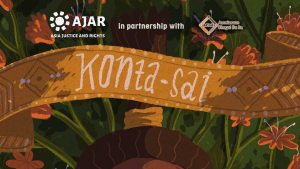
AJAR’s Short Film “Konta-sai” Awarded Best Film and Best Animation at ReelOzInd! Australia Indonesia Short Film Competition 2021
We are delighted and proud to announce that our animated documentary titled "Konta-sai" has been awarded the Best Film and...
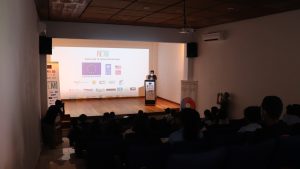
Screenings of AJAR’s Award-Winning Animated Films “Konta-Sai” and “8:45” at Dili International Film Festival
Dili, 7 October 2021 - Screenings of AJAR’s two animated films, “8:45”and the award-winning “Konta-Sai”, took place with students of...
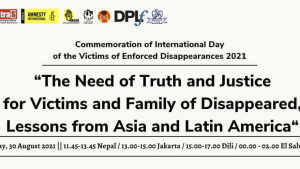
[WEBINAR] The Need of Truth and Justice for Victims and Family of Disappeared, Lessons from Asia and Latin America
30 August 2021 - To commemorate the International Day of the Victims of Enforced Disappearances, AJAR and our partners held...
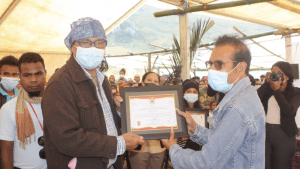
AJAR Timor-Leste receives the award of Civic Citizen Movement from the Prime Minister
José Luis de Oliveira, Director of AJAR Timor-Leste (left) receiving the award from Taur Matan Ruak, Prime Minister of Timor-Leste...
Resources
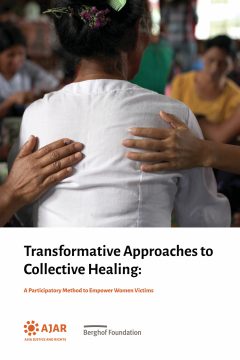
Transformative Approaches to Collective Healing: A Participatory Method to Empower Women Victims
How do communities move from surviving to healing after mass...

Mapping Commemorative Cultural Events, Best Practices, and Lessons Learned
PEMETAAN-BUDAYA-ACARA-PERINGATAN-...-ACEH-INDONESIADownload
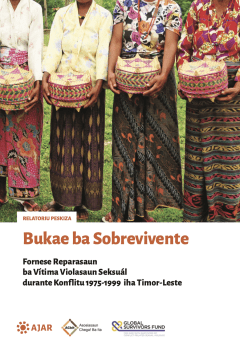
Bukae ba Sobrivivente: Providing Reparations for Victims of Sexual Violence during the 1975-1999 Conflict in Timor-Leste
This report outlines the scale and nature of the sexual...
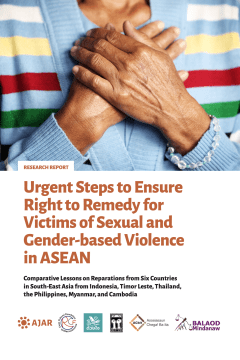
Urgent Steps to Ensure Right to Remedy for Victims of Sexual and Gender-based Violence in ASEAN
For over a year, the Transitional Justice Asia Network collected...

Transitional Justice Fact Sheet: Countries
Many Asian countries have faced a history of mass human...
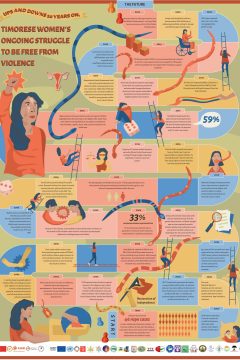
Twenty Years On Infographic
EN_InfographicDownload TE_InfographicDownload
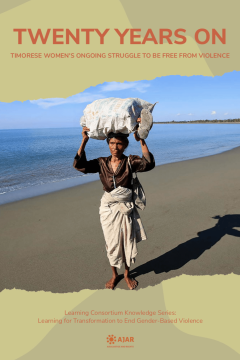
Twenty Years On: Timorese Women’s Ongoing Struggle to be Free from Violence
20 years on from the Restoration of Independence and the...

An Innovative Response to Disappearances: Non-Judicial Search Mechanisms in Latin America and Asia
Enforced disappearance, which has been used as a tool of...
